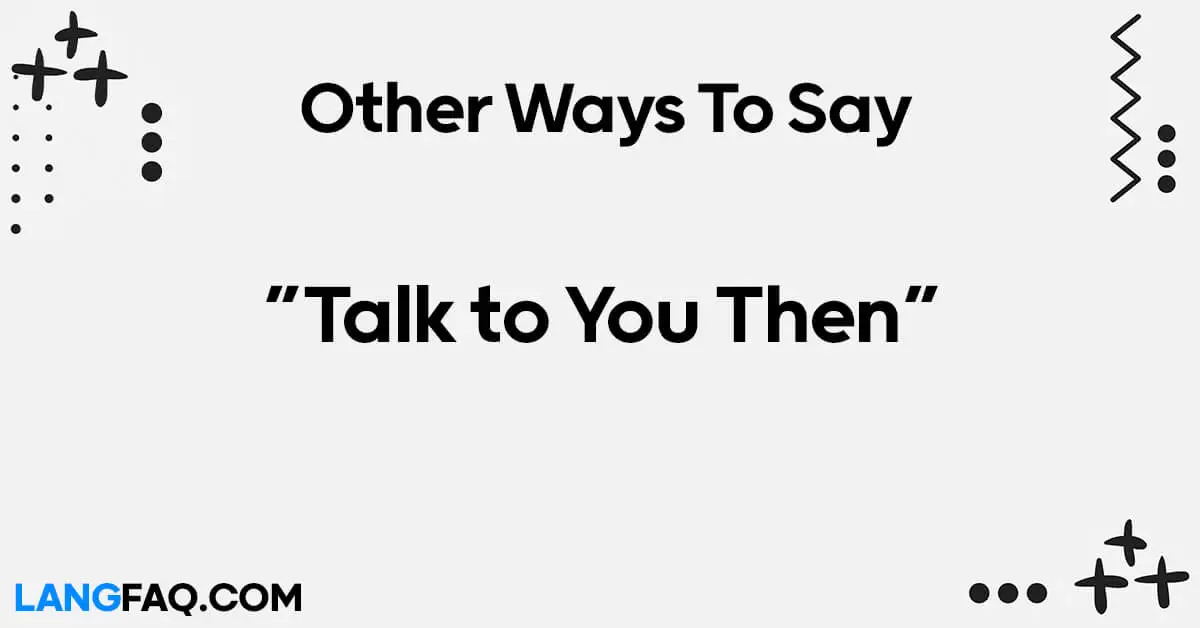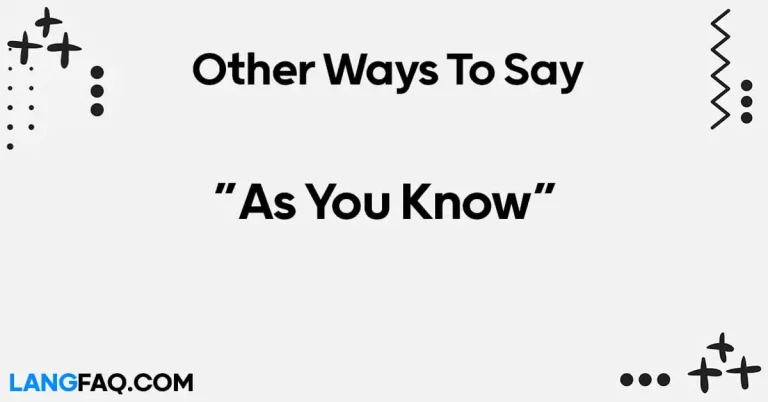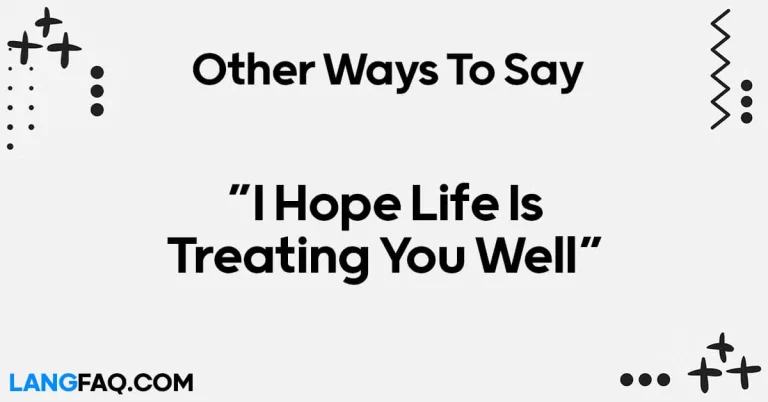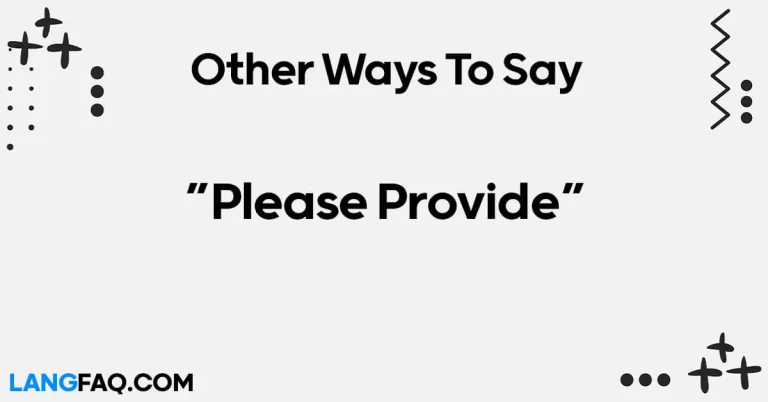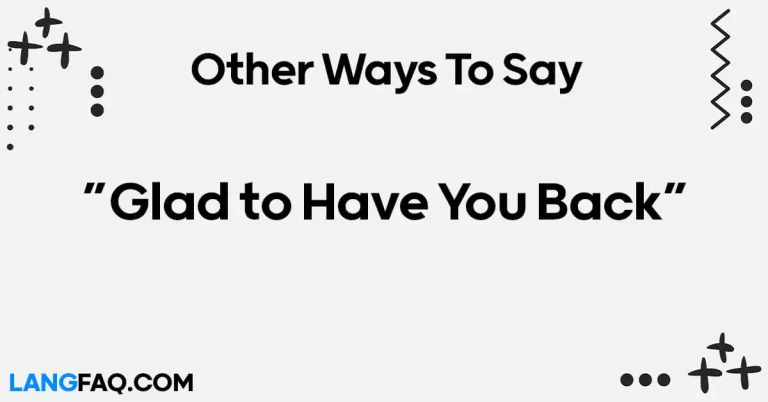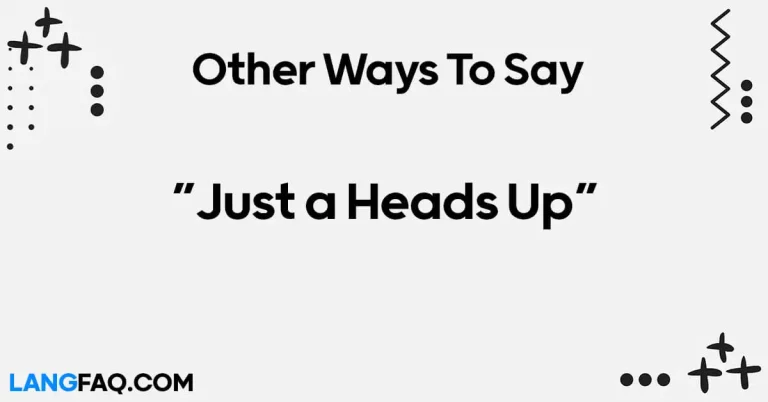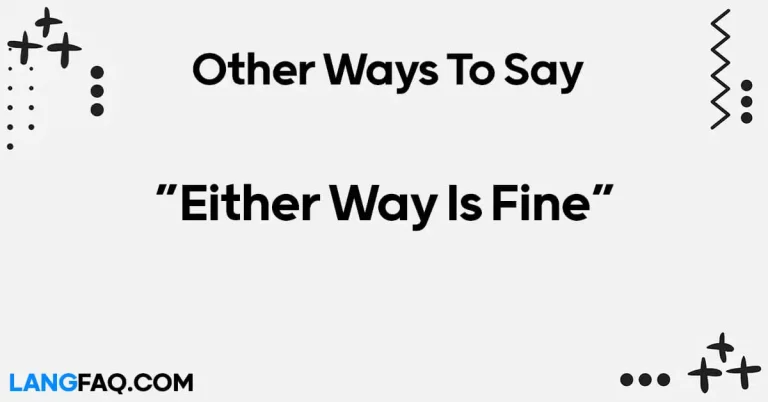In the vast landscape of communication, the way we bid farewell holds significant importance. “12 Other Ways to Say ‘Talk to You Then'” explores the diverse ways we can express our goodbyes, making each departure a unique experience.
12 Other Ways to Say “Talk to You Then”
Here are 12 other ways to say “Talk to You Then”:
- Catch you later!
- Until next time!
- Speak with you soon!
- Goodbye for now!
- Take care and chat later!
- Until we meet again!
- Looking forward to our next conversation!
- Adieu until later!
- Take it easy and talk to you then!
- Farewell for now!
- Until our paths cross again!
- Wishing you well until we talk again!
| Expression | Meaning | Example |
|---|---|---|
| Catch you later! | See you at a later time. | “I have to run now. Catch you later!” |
| Until next time! | Until we meet again. | “Thanks for the chat. Until next time!” |
| Speak with you soon! | Anticipating a future conversation. | “I’ll email you the details. Speak with you soon!” |
| Goodbye for now! | Temporary farewell. | “Leaving the office now. Goodbye for now!” |
| Take care and chat later! | Wishing well and expecting future communication. | “Stay safe! Take care and chat later!” |
| Until we meet again! | Hoping for a future meeting. | “Saying goodbye, but until we meet again!” |
| Looking forward to our next conversation! | Eagerly anticipating the next talk. | “Enjoyed our discussion. Looking forward to our next conversation!” |
| Adieu until later! | A more formal way to say goodbye temporarily. | “Leaving the party. Adieu until later!” |
| Take it easy and talk to you then! | Encouraging a relaxed farewell and expecting future communication. | “Have a stress-free day! Take it easy and talk to you then!” |
| Farewell for now! | Wishing goodbye for the time being. | “Off to a meeting. Farewell for now!” |
| Until our paths cross again! | Expressing hope for future encounters. | “Wishing you well until our paths cross again!” |
| Wishing you well until we talk again! | Conveying good wishes for the future. | “Heading out now. Wishing you well until we talk again!” |
These expressions provide a delightful array of alternatives to convey “Talk to You Then.” Whether you’re aiming for casual, formal, or anticipatory farewells, this diverse set of phrases allows you to bid goodbye with flair and warmth. Choose the one that best suits the context, ensuring your parting words leave a lasting positive impression.
Is It Correct to Say “Talk to You Then”?
Absolutely, “Talk to You Then” is a perfectly correct and commonly used phrase in casual and friendly communication. This expression is commonly used when parting ways and expecting to reconnect or talk again in the near future. It strikes a balance between informality and friendliness, making it suitable for various situations.
When to Use:
- Casual Conversations: It is ideal for everyday interactions with friends, family, or colleagues when you anticipate speaking with the person again soon.
- Virtual Communication: It is frequently used in digital communication, such as texting, messaging, or even ending an email when you plan to follow up.
Example Scenario:
Imagine you have just had a friendly conversation with a colleague, discussing weekend plans. As you wrap up, you might say, “Great catching up with you! Talk to you then, and have a fantastic weekend!”
Dictionary Insights:
According to the Cambridge Dictionary, the phrase “talk to you then” is an informal way to say goodbye when you expect to communicate with the person again soon. It implies a relaxed and friendly tone.
Grammar/Usage Tips:
- Informal Setting: It is more suitable for informal or semi-formal settings. In professional or formal communication, alternatives like “Speak with you soon” might be more appropriate.
- Follow-Up Intention: The phrase implies an intention to follow up or continue the conversation at a later time. Ensure that the context aligns with this intention.
Pros:
- Friendly Tone: It maintains a friendly and approachable tone, fostering positive communication.
- Versatility: It is versatile and can be used in various informal settings.
Cons:
- Informal Nature: In very formal or professional settings, it might be perceived as too casual. In such cases, alternatives with a more formal tone could be considered.
Professional Mail Example With “Talk to You Then”
Subject: Follow-Up on Project Discussion
Dear [Recipient’s Name],
I trust this email finds you well. I wanted to express my gratitude for the insightful discussion we had regarding the upcoming project during our recent meeting.
Your valuable input has provided a solid foundation for our next steps. I will be consolidating the details we discussed and will send over a comprehensive report by the end of the week.
If you have any additional thoughts or questions in the meantime, please feel free to reach out. I appreciate your commitment to the project’s success.
Looking forward to our continued collaboration and discussing the report with you soon. Talk to you then!
Best regards,
[Your Full Name] [Your Position] [Your Company] [Contact Information]
Catch You Later!
When it comes to casual and friendly farewells, “Catch You Later!” is a versatile phrase suitable for both formal and informal settings. This expression carries a sense of informality, making it perfect for conversations among friends or colleagues. It implies a relaxed departure, indicating you will reconnect at a later time.
Usage Scenarios:
- Between Colleagues: After a team meeting, you might say, “Great discussion, everyone! Catch you later!”
- Among Friends: Leaving a social gathering, you could say, “Had a blast! Catch you later, buddy!”
Example Sentence:
“Thanks for the quick update. Catch you later at the next team meeting!”
Email Sample:
Subject: Quick Update on the Project
Hi [Colleague’s Name],
I appreciate your prompt update. Everything looks on track. Let’s discuss the details further in our next team meeting. Catch you later!
Best regards,
[Your Name]
Variations:
- Catch You Later, Alligator!
- Catch You on the Flip Side!
Tip: Use this phrase in situations where a friendly, informal tone is appropriate.
Until Next Time!
“Until Next Time!” carries a sense of anticipation, making it suitable for formal and professional settings. This phrase implies a positive expectation for future interactions and is ideal for wrapping up business-related conversations or networking events.
Usage Scenarios:
- Professional Meetings: Concluding a client meeting, you might say, “Thank you for your time. Until next time!”
- Networking Events: After exchanging business cards, you could say, “Enjoyed our conversation. Until next time, perhaps at the next event!”
Example Sentence:
“Your insights were valuable. Until next time, let’s keep the collaboration going!”
Email Sample:
Subject: Follow-Up on Our Discussion
Dear [Client’s Name],
It was a pleasure discussing potential collaborations with you. I look forward to continuing our conversation. Until next time!
Best regards,
[Your Name]
Variations:
- Until We Meet Again!
- Until Our Paths Cross Once More!
Tip: Use this phrase in professional contexts where maintaining a cordial and optimistic tone is essential.
Speak With You Soon!
For a more immediate expectation of future communication, “Speak With You Soon!” is an excellent choice. This phrase is versatile and can be used in both formal and informal settings. It conveys a sense of eagerness and is suitable for various situations.
Usage Scenarios:
- Business Calls: Ending a conference call, you might say, “Thank you, everyone. Speak with you soon!”
- Casual Conversations: After a friendly chat, you could say, “Got to run. Speak with you soon, okay?”
Example Sentence:
“I’ll send over the report shortly. Speak with you soon to discuss the findings!”
Email Sample:
Subject: Report on Project Progress
Hi [Manager’s Name],
I’ve completed the project progress report. I’ll email it to you shortly. Speak with you soon to go over the details!
Best regards,
[Your Name]
Variations:
- Chat With You Soon!
- Talk to You Soon!
Tip: Use this phrase when you expect to reconnect or follow up within a short period.
Goodbye for Now!
When a temporary farewell is in order, “Goodbye for Now!” strikes a balance between formality and warmth. This phrase is suitable for both professional and personal relationships, expressing a sincere departure with the intention of reconnecting in the future.
Usage Scenarios:
- Workplace Farewell: Leaving the office, you might say, “Thank you, everyone. Goodbye for now!”
- Family Gathering: Departing from a family event, you could say, “Had a great time. Goodbye for now, see you at the next gathering!”
Example Sentence:
“I’ll be on vacation for the next two weeks. Goodbye for now, and I’ll bring back some souvenirs!”
Email Sample:
Subject: Out of Office Notice
Hi [Recipient’s Name],
I’m currently out of the office for a two-week vacation. If you need assistance, please reach out to [Colleague’s Name]. Goodbye for now, and I’ll be back on [Return Date]!
Best regards,
[Your Name]
Variations:
- Farewell for Now!
- Until We Reconnect!
Tip: Use this phrase when parting ways for an extended period, emphasizing the temporary nature of the goodbye.
Take Care and Chat Later!
Adding a touch of care to your farewell, “Take Care and Chat Later!” is a warm and friendly expression suitable for various relationships. It combines a genuine concern for the other person’s well-being with the expectation of future communication.
Usage Scenarios:
- Among Friends: Leaving a friend’s house, you might say, “Take care and chat later!”
- Professional Settings: After a team meeting, you could say, “Thanks, everyone. Take care and chat later during our next project update!”
Example Sentence:
“I heard you’re not feeling well. Take care and chat later when you’re back in good health!”
Email Sample:
Subject: Quick Update and Well Wishes
Hi [Recipient’s Name],
I hope this email finds you well. Just a quick update on our project progress. Take care and chat later for a more detailed discussion!
Best regards,
[Your Name]
Variations:
- Take It Easy and Talk to You Later!
- Stay Well and Catch Up Soon!
Tip: Use this phrase when expressing genuine care and concern, ensuring a positive and comforting goodbye.
Until We Meet Again!
“Until We Meet Again!” carries a sentiment of hope and optimism for future encounters. This phrase is suitable for various relationships, expressing a positive expectation of reconnecting at some point down the road.
Usage Scenarios:
- Social Gatherings: Leaving a party, you might say, “Thank you for the hospitality. Until we meet again!”
- Professional Settings: After a conference, you could say, “Enjoyed the networking. Until we meet again at the next industry event!”
Example Sentence:
“Our paths may diverge for now, but until we meet again, stay well and keep in touch!”
Email Sample:
Subject: Temporary Farewell and Gratitude
Dear [Recipient’s Name],
It’s with mixed emotions that I bid farewell for now. Your support has been invaluable. Until we meet again, thank you for everything!
Best regards,
[Your Name]
Variations:
- Until Our Paths Cross Once More!
- Looking Forward to Our Reunion!
Tip: Use this phrase when expressing gratitude and optimism for future connections.
Looking Forward to Our Next Conversation!
Expressing anticipation for future communication, “Looking Forward to Our Next Conversation!” is a positive and professional way to conclude discussions. This phrase conveys eagerness and sets the stage for continued engagement.
Usage Scenarios:
- Business Meetings: Wrapping up a client meeting, you might say, “Thank you for your time. Looking forward to our next conversation!”
- Networking Events: After exchanging ideas, you could say, “Enjoyed our discussion. Looking forward to our next conversation at the upcoming event!”
Example Sentence:
“Your insights have sparked some exciting possibilities. Looking forward to our next conversation to explore these ideas further!”
Email Sample:
Subject: Follow-Up on Recent Discussion
Hi [Client’s Name],
Our recent discussion has opened up exciting possibilities. Looking forward to our next conversation to delve deeper into these opportunities.
Best regards,
[Your Name]
Variations:
- Eagerly Awaiting Our Next Chat!
- Excited for Our Upcoming Dialogue!
Tip: Use this phrase to convey optimism and eagerness for continued communication.
Adieu Until Later!
For a more formal touch to your farewell, “Adieu Until Later!” is an elegant expression suitable for professional and sophisticated settings. This phrase adds a touch of refinement to your departure, making it apt for business meetings or formal gatherings.
Usage Scenarios:
- Corporate Events: Leaving a formal gathering, you might say, “Thank you for the insightful discussions. Adieu until later!”
- Professional Conferences: After a seminar, you could say, “Appreciate the knowledge shared. Adieu until later at the next conference!”
Example Sentence:
“Your presentation was enlightening. Adieu until later, and I look forward to future collaborations!”
Email Sample:
Subject: Appreciation for Your Contribution
Dear [Speaker’s Name],
Your presentation added immense value to our conference. Adieu until later, and I hope we can collaborate on future endeavors.
Best regards,
[Your Name]
Variations:
- Until We Reconvene!
- Farewell Until Our Next Meeting!
Tip: Use this phrase when formality and sophistication are required, enhancing your farewell with a touch of elegance.
Take It Easy and Talk to You Then!
For a relaxed and friendly departure, “Take It Easy and Talk to You Then!” is a laid-back expression suitable for various relationships. This phrase combines a wish for an easygoing time with the expectation of reconnecting in the future.
Usage Scenarios:
- Among Friends: Leaving a casual hangout, you might say, “Had a great time. Take it easy and talk to you then!”
- Workplace Farewell: After a team meeting, you could say, “Thanks, everyone. Take it easy and talk to you then during our next project update!”
Example Sentence:
“The weekend is approaching. Take it easy and talk to you then for our virtual game night!”
Email Sample:
Subject: Quick Update and Weekend Wishes
Hi [Colleague’s Name],
A quick update on our project progress. Take it easy and talk to you then, and have a fantastic weekend!
Best regards,
[Your Name]
Variations:
- Relax and Chat Later!
- Wishing You an Easygoing Day and Talk to You Soon!
Tip: Use this phrase when aiming for a friendly and easygoing farewell, suitable for various informal settings.
Farewell for Now!
When a more formal and traditional farewell is appropriate, “Farewell for Now!” strikes a balance between professionalism and warmth. This phrase is versatile, suitable for both business and personal relationships, conveying a sense of departure with the intention of reconnecting in the future.
Usage Scenarios:
- Workplace Departure: Leaving the office, you might say, “Thank you, everyone. Farewell for now!”
- Family Gatherings: After a family event, you could say, “Had a wonderful time. Farewell for now, and see you at the next gathering!”
Example Sentence:
“I’ll be on a business trip for the next few weeks. Farewell for now, and I’ll stay in touch!”
Email Sample:
Subject: Temporary Departure Notice
Hi [Recipient’s Name],
I wanted to inform you that I’ll be on a business trip for the next few weeks. Farewell for now, and I’ll stay connected through email.
Best regards,
[Your Name]
Variations:
- Temporary Farewell!
- Until We Reconnect!
Tip: Use this phrase when parting ways for an extended period, emphasizing the temporary nature of the goodbye.
Until Our Paths Cross Again!
Adding a touch of poetic optimism to your farewell, “Until Our Paths Cross Again!” expresses hope for future encounters. This phrase is suitable for various relationships, infusing your departure with a sense of connection that transcends the current moment.
Usage Scenarios:
- Social Gatherings: Leaving a party, you might say, “Thank you for the hospitality. Until our paths cross again!”
- Professional Settings: After a conference, you could say, “Enjoyed the networking. Until our paths cross again at the next industry event!”
Example Sentence:
“Our professional journeys may lead us in different directions, but until our paths cross again, let’s stay connected!”
Email Sample:
Subject: Gratitude and Temporary Farewell
Dear [Recipient’s Name],
As I embark on a new professional journey, I want to express my gratitude for our collaboration. Until our paths cross again, stay well and stay connected.
Best regards,
[Your Name]
Variations:
- Until We Meet Once More!
- Looking Forward to Our Reunion!
Tip: Use this phrase when expressing gratitude and optimism for future connections.
Wishing You Well Until We Talk Again!
Combining warm wishes with the anticipation of future communication, “Wishing You Well Until We Talk Again!” is a thoughtful and considerate farewell suitable for various relationships. It conveys a sense of care and positive regard.
Usage Scenarios:
- Among Friends: Leaving a friend’s house, you might say, “Wishing you well until we talk again!”
- Professional Farewell: After a collaborative project, you could say, “Thank you, everyone. Wishing you well until we talk again during our next venture!”
Example Sentence:
“Your dedication to the project was commendable. Wishing you well until we talk again for our upcoming initiatives!”
Email Sample:
Subject: Appreciation and Wishes for Future Collaborations
Hi [Team’s Name],
As we conclude this project, I want to express my gratitude for your hard work. Wishing you well until we talk again for our upcoming initiatives.
Best regards,
[Your Name]
Variations:
- Take Care and Talk to You Soon!
- Wishing You Success Until Our Next Discussion!
FAQs
Are these phrases suitable for both formal and informal settings?
Absolutely, the versatility of these phrases allows them to be used in various contexts, be it professional or casual.
Can I use creative farewells in a professional email?
While it’s essential to maintain professionalism, adding a touch of creativity can enhance your communication, even in professional emails.
How can cultural variations impact my choice of goodbye phrases?
Understanding cultural nuances is crucial. Tailor your farewells to align with the cultural norms of your audience.
Are slang and jargon appropriate in all situations?
Exercise caution; while slang can add informality, it may not be suitable in formal or professional settings.
Should emotional farewells be reserved for close relationships?
Emotional farewells can be genuine expressions of appreciation. Use discretion based on the nature of your relationship.
Can unconventional endings backfire in certain situations?
While they can be memorable, assess the context and your audience before opting for unconventional farewells.
Conclusion
In the realm of goodbyes, the variety of expressions available allows us to tailor our farewells to specific situations and relationships. “12 Other Ways to Say ‘Talk to You Then'” empowers you to navigate farewells with grace, ensuring each goodbye is meaningful and memorable.

